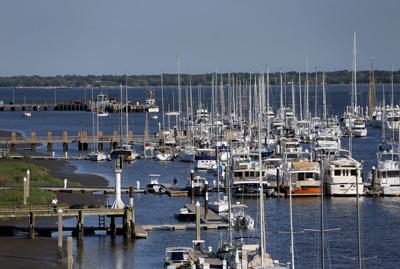You might accuse me of oversimplification, but I wish to assert that, essentially, the waters around Charleston provide habitat for four kinds of boaters. Two kinds prefer power boats, and two kinds prefer sailboats.
I know, I know, some people like parasailing or kayaking or zipping around on Jet Skis. Fine. Good. But I am focusing on vessels large enough to accommodate at least a few people at a time.
In Charleston’s power boat ecosystem, you’ve got your anglers and your pleasure seekers. The former finds a perverse pleasure in suffering bouts of loneliness and enduring stretches of missed opportunities. The latter don’t care about fish at all; they’re out there to drink beer and hang with friends, to anchor and swim, and to drown out the sounds of nature with loud music.
Among sailors, instead, you’ve got your cruisers and racers, two entirely different breeds that share in common a certain obsession with the wind. The former consist of waterborne nomads happy to hop from harbor to harbor, marina to marina, anchorage to anchorage, with the goal of seeing the wetter parts of the world. The latter are adrenaline junkies who like the exhilarating thrill of beating an opponent to the windward mark.
About those anglers: They are not always lonely (often, they go out with friends or family or paying charter guests) and they don’t always wait long before the action starts. Charleston’s waters are well-populated with fish of all sorts: black drum and bass and redfish inshore; mahi and grouper offshore.
The fishing is good enough to justify tournaments and attract a disproportionate number of large center-console triple- and quad-powered boats to Lowcountry waters. These vessels, with their rows of outboard 300 horse-power motors, can reach speeds of 50, 60, even 70 mph, and get to the Gulf Stream in less than 90 minutes.
Out there, you might catch a tuna or wahoo, jack fish or a really big red snapper.
Close to shore, all you really need is a skiff, or even a johnboat with a modest outboard, and you can tuck into the crook of a creek, up against the spartina grass, and hunt for redfish, sheepshead, sea trout or drum.
About those sailors: The cruiser community includes young couples and families — self-sufficient misfits who can repair a diesel engine with one hand while they nurse the baby with the other — as well as retirees looking for adventure before their suns set, and a few grizzled middle-agers who generally prefer the sea birds and dolphins to humankind.
The cruisers might motor sail down the Intracoastal Waterway then island-hop in the Bahamas, or they might commit to major crossings, hopping not between islands but between continents, spending extended periods in remote harbors, hobnobbing a bit with other boaters.
The racers, instead, look for any chance to push a sailboat to her limit. They hope to reach speeds of 5, 6, 7, even 8 knots, and to maximize the power of the breeze. They feed on stress and a captain’s curses. They delight in the flutter of a telltale. They grind winch handles as if drilling for crude oil. They pull a line as if their lives depended on it.
Racers are focused. They stare at the surface of the water looking for signs of wind puffs. They attend to the boats ahead of them in an effort to anticipate trouble or adjust their point of sail. They thrill when boats get close.
The cruisers want to span oceans; the racers are content sailing in small circles. The cruisers want to win access to foreign cultures; the racers want to win plastic tumblers with a burgee imprinted on them. The cruisers seek out exotic sea life along coral reefs; the racers seek buoys, day markers and perhaps a dolphin sighting.
The serious anglers are on a mission. The pleasure boaters are more or less aimless. The cruising sailors are patient. The racing sailors are less patient than the cruisers, but more patient than the pleasure boaters.
The divide between power boaters and sailors is pronounced. Most power boaters think sailboats are too slow and too quiet. Most sailors think power boats are too fast and too loud.
But in Charleston Harbor and in the Lowcountry’s nearshore waters, there’s plenty of room for everyone.
Click here for a listing of winners in the Automotive, Boat & RV categories for the 2022 Charleston's Choice awards.







